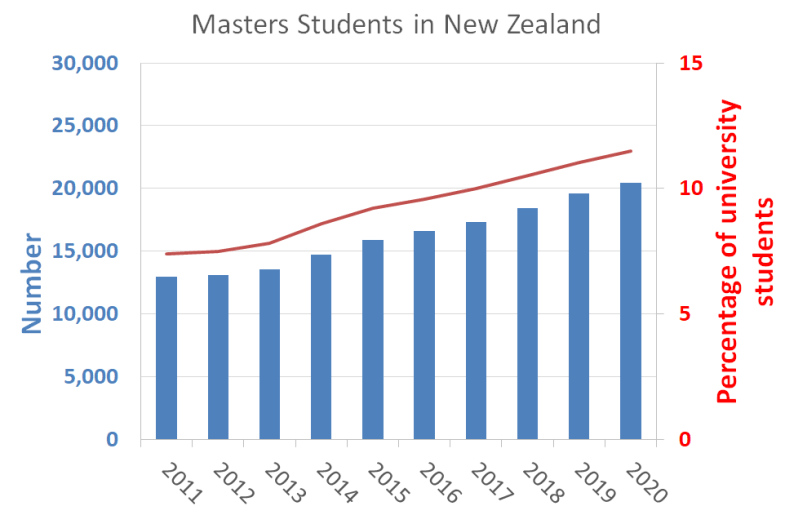点击阅读英文原文
今年7月,《华尔街日报》(The Wall Street Journal)发布文章,揭露了在美国攻读硕士学位的学生所积累的巨额债务。这些两年制课程的学费高达每年10万美元(约63万人民币)。尽管学者很快反驳了硕士学位是为了赚钱的说法,但这个故事还是传遍了全球。
在我的祖国新西兰,国内学生每年只需要支付约7000新西兰元(约3万人民币),而国际学生需要支付约2.8万(约12万人民币)。但新西兰教育部2017年的一项调查显示,学生们可能看不到这种投资的回报。硕士毕业生在毕业10年后的收入将比本科毕业生高出30%左右,但他们的收入不会比拥有研究生文凭(postgraduate diploma)的人高出多少。研究生文凭的成本更低,因为只需要一年就能完成学业。
尽管如此,新西兰的硕士学生数量在过去10年增长了50%,到2020年占所有大学生的10%以上。

过去攻读硕士学位的原因有两个:一是成为一名学者,二是获得进入医学、法律或兽医科学等行业所需的资格。现在,学生们也会为在商业、医疗和政府政策领域的职业做准备而攻读硕士学位。许多学生认为他们现在需要一份有竞争力的工作。
问题在于,高校能否提供这些学生所需要的教育体验。一种类型的硕士教育侧重于课程,传授给学生先进的学科知识和技能。针对文理学院的研究生,第二类学位教育结合了研究训练和课程学习。我认为我们需要重新设计第二类教育。
THE Campus resource: Fostering interdisciplinary learning in large-scale doctoral programmes
今年4月,新西兰生产力委员会(New Zealand Productivity Commision)发现,研究生不具备新西兰最具生产力的公司所需要的复杂技能。他们的劳动生产率(每小时工作的产出)还不到瑞典或新加坡等其他小型发达经济体中同类企业的一半。委员会建议评估企业未来的需求,以建立更好的研究生人才输送渠道。
但这并不像听起来那么简单。例如,我们知道,科学方面的研究生将需要传统科学方面的技能,以及数据科学和商业技能。但澳大利亚毕业生就业组织最近的一份报告发现,雇主很难预测未来员工需要哪些技能。
新西兰的公司正在向出口市场的利基市场扩张,比如具有环保和社会认证的产品领域。这意味着他们需要有创造力的研究生,这些毕业生们既具备某一学科的研究技能,又能超越传统学科界限,找到满足客户需求的最佳方法。因此,硕士学位应该采取多学科的教育。理论课程应该由来自不同学科的讲师共同教授,此外还需要基于技能的课程和关于如何学习新知识和复杂知识的研讨课。
我们的目标应该是教学生如何整理分散的知识。这种培训对学生来说是有用的,无论他们是要进入业界还是学术界。因为未来的学者将需要与业界进行互动,以寻求资金,并确定他们的学生在职业生涯中需要哪些技能。
为什么根据教育部的数据,只有一半的新西兰硕士学生在预期的两年内完成学业,这一点也很重要。原因似乎是攻读课程与研究相结合的学位的学生花了太多时间为他们的论文做研究。但是,写就这样一份论文对那些不进入学术界的学生真的有用吗?让他们展示自己的研究技能应该是首要任务。较短的评估,例如文献综述、开题报告和研讨会,在这方面会更加有效。
改革硕士学位结构是双赢的。学生们将获得他们想要的技能和收入增长,而高校将吸引更多的学生,并减少质疑其价值的新闻。
凯瑟琳·惠特比是梅西大学(Massey University)的化学副教授。
本文由陆子惠为泰晤士高等教育翻译。
后记
Print headline: Make master’s a mixed bag
请先注册再继续
为何要注册?
- 注册是免费的,而且十分便捷
- 注册成功后,您每月可免费阅读3篇文章
- 订阅我们的邮件
已经注册或者是已订阅?

